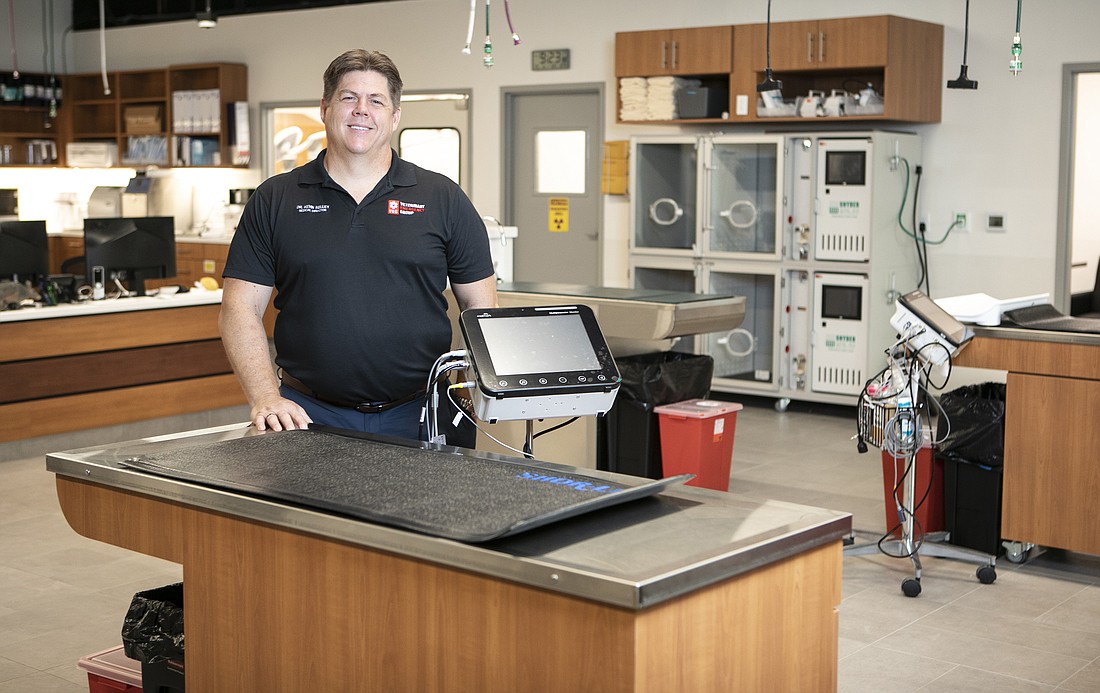- July 26, 2024
-
-
Loading

Loading

A national veterinary care company opened its third Tampa Bay location in Clearwater on Oct. 10, says Kevin Kelley, medical director for Veterinary Emergency Group's newest location.
The animal hospital system prides itself on being the only national emergency care provider that allows pet owners to stay with their pets through all phases of care. In other words, you can sleep next to your pet as he or she is being cared for.
Kelley says the treatment area is unique too, as there are no waiting rooms in the group's hospitals. Pet owners and their pets are brought right into the care center where animals are being treated. The group operates their unique pet hospitals in 21 states. Clearwater will be location No. 63.
Hillsborough County already has two: One in the north at 238 E Bearss Ave., Tampa; and a second in south Tampa at 1501 S. Dale Mabry Highway.
While the group often boasts of its overnight stays of pet owners, the layout of the care centers are also unique to the industry. Kelley says the hospitals use a style called "ROVER," or radical open veterinary emergency room. The ROVER in Clearwater will be Florida's first.
"You are greeted by a receptionist and you are already right there in the middle of the treatment area," says Kelley. "The hospital is about 5,000 square feet, most of it is the treatment area."
Kelley says there are five traditional exam rooms, in case the pet has "dog aggression" or may just like tighter walls.
"I think the clients are more comfortable first and foremost, because there is transparency about what is going on," says Kelley, 49. "And it builds an interesting dynamic."
That dynamic means clients are not likely to be impatient as they see staff treat other animals in the queue first.
When asked if it resembles a busy emergency room for humans, Kelley agreed.
"We makes owners part of the team," says Kelley. "If we have an animal that needs flow-by oxygen, we have the owners holding (the mask)."
The company was founded in 2014 in New York, and remains headquartered in White Plains, New York. The group says it treats more than 400,000 emergencies annually across 21 states.
The company says "it takes the stress out of pet emergencies by connecting pet parents with a doctor the second they walk in the door." But as any pet owner might attest to, a selling point may be allowing pet owners to snooze next to their pets. If an animal is spending the night, owners get that option.
"In our traditional exam rooms, we have pull out sofas in them," says Kelley.
Kelley says Veterinary Emergency Group also focuses on the staff and their quality of life.
Kelley says the nature of the work — putting animals down because of old age or accidents — can be emotionally taxing. Vets are also subject to "digital bullying," he says, because sometimes animal owners blame the doctors and staff for bad outcomes. It leads to higher-than-average rates of suicide, divorce and substance abuse for vet workers, he says.
In addition, some animals have catastrophic wounds that require surgery that could cost between $5,000 and $12,000, he says. That means sometimes the staff bears the brunt of the grief. And putting down a pet for financial reasons is "one of the most devastating things" for vets and staff, he says.
"It takes a part of your soul," Kelley says.
The group tries to ease those stressors upon staff, Kelley says, as he notes the national conversation is finally improving.
"We're only now dealing with mental wellness in veterinary medicine," says Kelley. "It's just now something that is coming to the forefront."
Kelley himself looked for a change after doing emergency animal services for 18 years, and in leadership for five. He liked what he saw at the group, which employees call VEG, and reached out to a doctor familiar with the operation.
It's quite a change for Kelley, who has longtime experience treating all kinds of animals such as skunks, sloths and "pocket pets," such as sugar bears. But the emergency factor remains in some cases, and Kelley says he is always honest with the pet owners whose animals have severe pain, cancers, wounds or age problems.
"I start addressing quality of life," says Kelley. "It's the last gift they give them as their guardian, to say it's OK to stop."
But the experience at the ER doesn't have to be grim. If animals require closer care by the staff, some pet owners decide to sleep on the floor next to the kennels.
Such close proximity lowers stress levels for both the animal and the owner, Kelley says, which can be beneficial to the animal. And If an animal owner or family does not wish to be around so many sick pets, they can be moved to other rooms.
The floor plan leads to a "community" aspect, Kelley says — not between animals, but between humans.
"Those interactions are amazing," says Kelley. "I have seen owners consoling other owners when their animal is struggling. I have had owners pay other owner's bills. … Seeing that humanity is amazing."